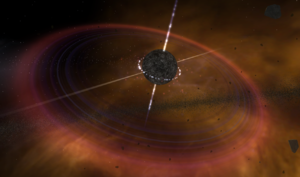
|
This wiki is closed in favour of the new wiki. Information shown is likely to be very out of date. |
Difference between revisions of "Neutron Star (Omega-41)"
Silverleaf81 (talk | contribs) m |
(Pic file layout fixed. Category added) |
||
| Line 9: | Line 9: | ||
A clearing of debris exists in close proximity to the Neutron Star, however entering this area is not recommended due to the intense radiation and powerful magnetic and gravitational field of the object. | A clearing of debris exists in close proximity to the Neutron Star, however entering this area is not recommended due to the intense radiation and powerful magnetic and gravitational field of the object. | ||
| − | [[File:Omega-41 | + | [[File:Neutron Star (Omega-41).png|300px|border|thumb|upright=5|left]] |
| + | {{Clear}} | ||
| + | |||
| + | |||
| + | [[Category: Edge Worlds]] | ||
| + | [[Category: Natural Phenomenon]] | ||
Revision as of 14:48, 28 November 2018
The Neutron Star found at the center of Omega-41 is the most commonly seen one in Sirius, due to the many system connections present. It is one of only 2 known to emit visible radiation, a characteristic it shares with a Neutron Star in a nearby system. It also has a visible ring system, a distinction that only the Puerto Rican Neutron Star also has.
The Neutron Star present was created long before humans discovered Omega-41; When the star at the center of the system went supernova, it shattered all of the planets in the system into a massive asteroid field, and caused the star to collapse into the Stellar Remnant seen today. The left over system is constantly bathed in radiation from the Neutron Star, with only the Planetary Fragments providing protection.
A clearing of debris exists in close proximity to the Neutron Star, however entering this area is not recommended due to the intense radiation and powerful magnetic and gravitational field of the object.
